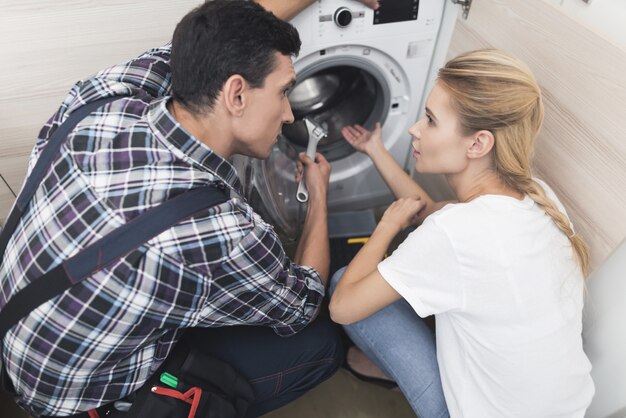If you've ever been stuck with a broken washer, you've probably wondered: Should I attempt to repair this myself or call a professional? With countless YouTube tutorials and DIY repair guides at your fingertips, it's tempting to grab a wrench and try your hand at washer repair. But is this the best option?
In this blog, we'll explore whether DIY washer repair causes more harm than good and answer frequently asked questions about common washer problems. You'll discover the potential risks, common pitfalls, and why sometimes it's better to leave it to professionals of washer repair in Langley or wherever you reside.
Can DIY Washer Repair Save You Money?
At first glance, DIY washer repair seems like a money-saving option. You skip the repairman's fees and only need a few tools and online guidance. But does it save you in the long run?
- The Hidden Costs of DIY Repairs
- Many people need to consider the potential hidden costs of DIY washer repair. For example, if you misdiagnose the issue, you might buy parts you don't need. Worse, you could accidentally cause more damage to the washer, leading to a higher repair bill when you finally call in a professional.
- Improper Parts Installation
- Installing a part is a common mistake in DIY repairs. Washing machines are complex, and many of their components are sensitive. For example, a poorly installed drum belt or water pump can lead to leaks, electrical malfunctions, or even a total breakdown.
What Are the Most Common DIY Washer Repair Mistakes?
Even the handiest homeowners make mistakes during DIY washer repair. Here are some of the most frequent blunders:
- Misdiagnosing the Problem
- Washers can have many parts fail, and symptoms often overlap. A noisy spin cycle could be caused by a worn-out drum bearing, a loose belt, or something entirely different. If you misdiagnose the problem, you might end up replacing the wrong part, which will cost time and money.
- Ignoring Safety Protocols
- Washers involve electricity and water, which is dangerous if you need to become more familiar with proper safety protocols. Forgetting to unplug the machine or mishandling electrical components can lead to shocks or other safety hazards.
- Using the Wrong Tools
- DIY washer repair requires specific tools many people don't have at home. Using the wrong tools can damage sensitive parts of your machine, making a simple fix a much bigger problem.
Is DIY Washer Repair Dangerous?
The combination of water, electricity, and heavy machinery makes washers potentially hazardous to work on. Here's why DIY repairs can sometimes be dangerous:
- Electrical Risks
- Washers have high-voltage components that can cause serious injury if not handled correctly. You might feel comfortable replacing a part, but the consequences could be severe if you accidentally touch the wrong wire or skip a step in the repair process.
- Water Damage
- A poor DIY repair can cause water leaks that aren't immediately noticeable. Over time, this can lead to water damage in your laundry room or even mold growth, which can be costly.
- Physical Injury
- Washers are heavy and difficult to maneuver. Repairing a washer without proper precautions can lead to physical injuries, especially if you need to lift or move the machine.
Does DIY Washer Repair Void Your Warranty?
One important consideration is your washer's warranty. Many manufacturers require that a certified technician perform repairs. Attempting DIY repairs could void the warranty, meaning you would have to pay for future repairs out of pocket.
- What Does the Warranty Cover?
- Washer warranties typically cover parts and labor for a certain number of years. However, the fine print often states that DIY or non-authorized repairs will void the warranty. This could leave you unprotected if something else goes wrong with your machine later.
When Should You Call a Professional Washer Repair Service?
So, when should you skip the DIY route and call a professional? Here are a few signs that it's time to bring in the experts:
- Complex Electrical Issues
- If your washer has electrical issues, such as not powering on or strange error codes flashing, it's best to leave it to the professionals. Electrical repairs are dangerous and often require specialized knowledge and tools.
- Major Leaks or Water Damage
- You can handle a small leak, but if water starts pooling around your washer, it's time to call in a professional. Water damage can lead to significant repair costs if not handled correctly.
- Repetitive Issues
- If your washer keeps having the same issue after a DIY fix, it signifies a deeper problem. Professional technicians can diagnose and fix the root cause, saving you from repeated headaches.
Conclusion: Is DIY Washer Repair Worth the Risk?
While DIY washer repair might seem quick and cheap, it often leads to more harm than good. Misdiagnosing the problem, improper installation, and the potential for electrical hazards or water damage are just a few risks. Ultimately, trying to fix your washer yourself could result in higher costs or even personal injury.
That's why it's often better to turn to experts like Washer Repair Langley professionals with the tools, knowledge, and experience to do the job right. By hiring a certified technician, you avoid the pitfalls of DIY repairs and ensure your washer is fixed safely and efficiently.
If you need clarification on your washer's condition or need professional assistance, AMP Appliance Repair is ready to help. Their team of experienced technicians specializes in washer repair and can ensure your appliance is up and running without causing further damage. Don't let a small issue become a costly disaster—get the help you need.
